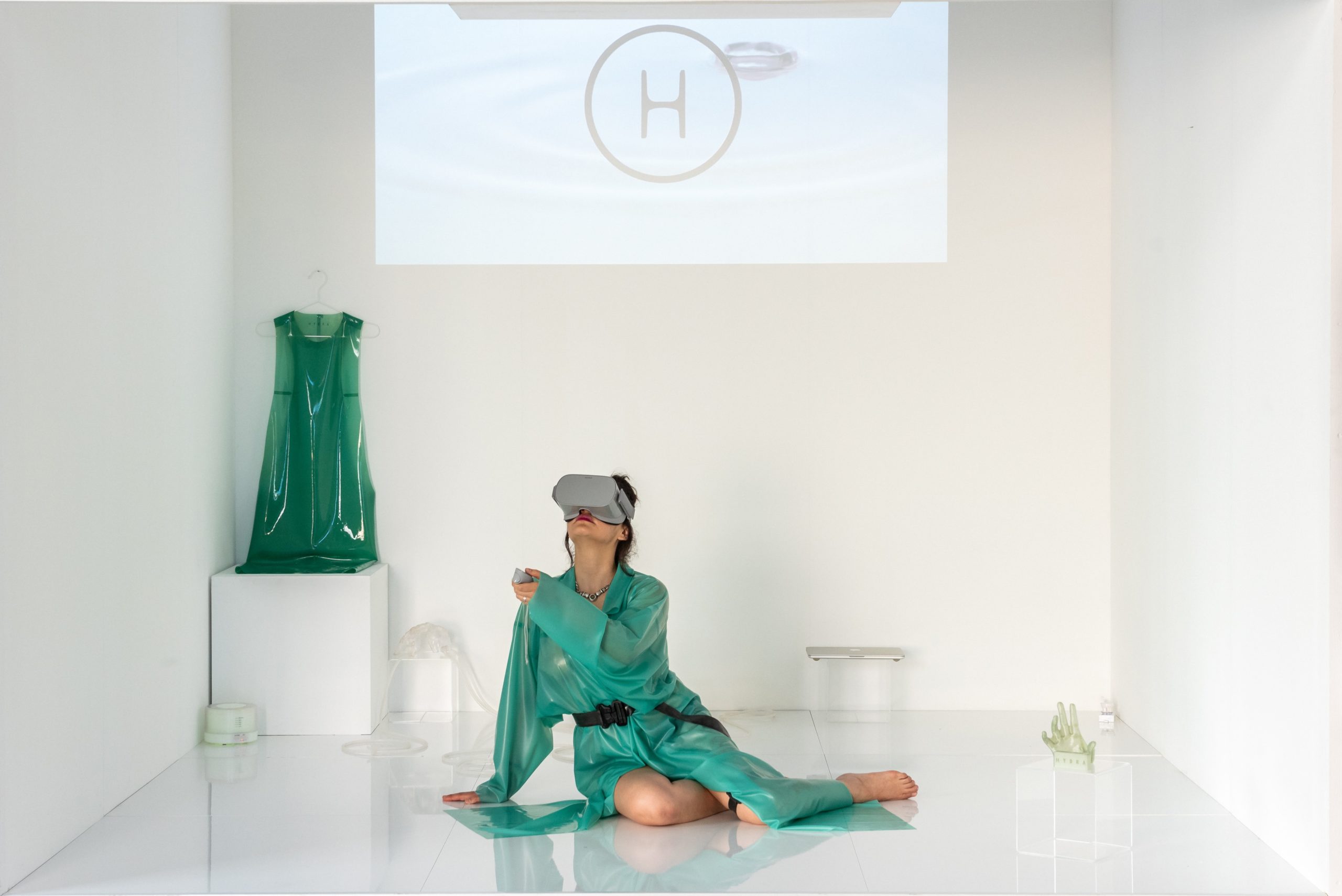
Tell us a bit about yourself.
I remember the exact moment I started feeling unable to function properly within this reality. It was around the age of three, in my kindergarten year, when interactions with other people started to mean communicating through symbols rather than through primordial, love-based interactions. I began to understand that the way I looked, the clothes I wore, and the way I moved were both tools for survival and social weapons. I studied fashion design and theory back in Milan, but my interests lie in the body within society creating and projecting an infected reality around itself, which shapes the avatar it presents. Living through my own simulated self became a never-ending performance, and an anthropological study.
I now define myself as an artist, creative director, and researcher in the field of consciousness in relation to the body. My practice revolves around a series of artefacts and intervention to explore sustainability, craft and longevity in a transpersonal future, according to a regenerative culture agenda. It considers the evolution of the human condition and how we exist, operate and evolve within our shifting realities. What began as the manipulation of my innocence through actively performing an avatar became an honest path of re-discovery and restoration of that innocence.
I now define myself as an artist, creative director, and researcher in the field of consciousness in relation to the body
In witnessing the dynamics of the fashion industry, I developed a fascination with consumer behavioural patterns. I question the roles that pleasure and desire play in our consumption choices, and what exactly makes us want to own, accumulate and possess objects. My ultimate goal is to work directionally towards offering a service, rather than a product. Humans interact through emotional transactions, it’s our undeniable nature. I want to understand how to shift this truth into something positive — how these emotional transactions can be based not on ownership and fear of losing, but a fluid sharing of experiences. Within the span of five years, I have gradually shifted the focus of my work from objects of desire, as in HYDRA Sartorial Latex, to immersive experiences, as in the HYDRA Phygital Program.
Tell us about the HYDRA Phygital Program. Can you elaborate on the term ‘Phygital?’
‘Phygital’ is a relatively young term coined in the marketing and strategy fields, describing the merging of online and offline environments within a customer experience and utilising the strongest aspects from both. I was one of the first people to introduce this term ‘phygital’ into the art world. The HYDRA Phygital Program unfolds around a series of immersive, performative installations and workshops, focused on accessible technological tools. The use of tools both from physical and digital interactions — the phygitality — is central to the program.
I was one of the first people to introduce this term ‘phygital’ into the art world
Viewers enter safe spaces of nonverbal shared experiences, sensory stimulation and deprivation induced by VR, light therapy, high frequency vibration, and sound installation. Whilst wearing a VR headset, the viewer is guided through a meditative simulation through physical inputs such as nurturing touch and breathing exercises. The physical inputs constantly fluctuate in reaction to the viewer’s growing sensitivity towards the virtual experience. Chlorinated natural latex rubber is used to create tissue-like wearable artefacts that emulate the aesthetic, feel, form and construction of the HYDRA transpersonal avatar.
In 2020, we’ll see developments in the HYDRA Phygital Program with the release of HYDRA Phygital Spa Centre, where people can actually come and choose what services to benefit from. I see technology as a tool, rather than an enemy, because we are the ones that create the algorithms that can make it one or the other. My kind of technology is a nurturing, approachable variant that can serve us in a non-isolating manner.
Tell us about Sartorial Latex: organic interfaces.
I began my practice by developing the HYDRA Sartorial Latex uniform. I was not interested in producing fashion at all — I wanted to create a tangible connection between myself and the audience. Each piece is uniquely and consciously handcrafted in the H Y D R A lab through a meditative ritualistic approach, and is biodegradable, adaptable, waterproof, and plant-based. Sartorial Latex has to do with training ourselves to be present in multiple realities, and how these organic interfaces can function as an extension of the body. I call the garments ‘organic interfaces’ (‘organic’ here meaning ‘living and breathing’) because of this pierce-able barrier that they represent. They invite touch, therefore, interaction with another presence. I like to imagine the Hydra universe to be a water-based, conscious universe where everything is interconnected, and free energy is exchanged.
Have any projects or collaborations been a notable turning point for you?
I can trace the evolution of my practice step by step through and thanks to collaborations that I’ve undertaken. Artists such as Arca, Hanna Perry, Keiken, Vessel, Nozomi Iijima, Labour, and Last Yearz Interesting Negro (to name a few) have inspired me by giving new life to the HYDRA uniform in their performances. I also worked on the collaborative “Honey, I’m Data!,” an itinerant performative lecture exploring the future of the physical/virtual world posing critical analysis on popular solutions like empathy and altruism (created by Keiken featuring Agf HYDRA, George J. Stone, Suzannah Pettigrew, Sophie Mars, Zaiba Jabbar, and Nati Cerruti).
The most significant work lies ahead in the future. I am the most excited about the ongoing evolutions within the HYDRA Phygital Program London-based family (digital artist Maurice Andresen, executive producer and creative consultant Finbar Mostyn-Williams, producer and managing consultant Hervisions) and the recent Berlin-based MITRA (Labour, Evelin Bancicova, Enes Guc, Zeynep Schilling). My prior work has led me to this feeling of unity and inner expansion, that the HYDRA Phygital Program is the real purpose of my work. It will keep growing, and will continue to be an ongoing holistic practice supported by the interconnection between science and spirituality.
